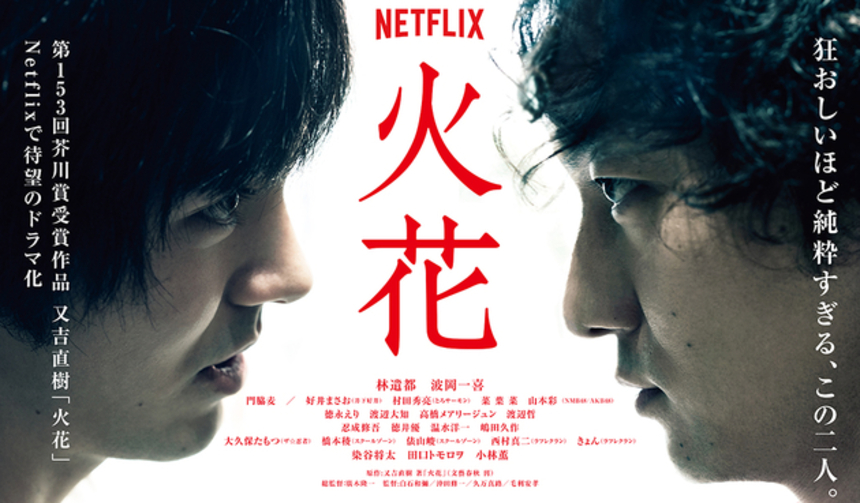Okinawa 2016 Review: SPARK, Netflix Plants Their Flag In Japan

Much like they already have in the States, Netflix has been ramping up its local productions in Japan following their launch their last September. Though not their first original Japanese series, Spark (or Hibana), which is based on a popular novel by stand up comedian and poet Matayoshi Naoki, is poised to be their most high-profile splash yet. Three of the series' ten episodes premiered in the opening slot of the recent Okianawa International Movie Festival, before the whole show rolls out simultaneously in all of Netflix's markets in June 3rd.
Set within the world of Manzai comedy, a popular two-man form of rapidfire standup, Spark focuses on Tokunaga, a young comedian struggling to make it with his Manzai duo Sparks. He meets Kamiya, an eccentric and jaded member of an older duo and the two begin an odd friendship that blossoms when the latter relocates his group Ahondara from Osaka to Tokyo. Tokunaga asks Kamiya to mentor him, to which he agrees on one condition, Tokunaga must write his life story. Their friendship continues over the years while each experiences varying levels of success.
Unlike the American Netflix shows we've become accustomed to, Spark immediately announces itself as something more low-key and downbeat. Largely dialogue-based, the show explores failure, loneliness and society's apathy towards our individual concerns. This mood prevents the show from being immediately accessible but as a slow burn it provides a increasingly compelling look at a group of down-on-their-luck characters navigating the expansive Tokyo metropolis. That's not to say Spark isn't entertaining, as the show features plenty of humor and a host of supporting turns from Japanese comedians. And of course, at the heart of the series are its showcases of Manzai performances, yet this becomes a double-edged sword.
As a form of comedy that features hyperactive men barreling lines between each other which are filled with puns and double-talk, Manzai is fascinating to watch but is bound to pose a barrier to anyone not fluent in Japanese. Kitano Takeshi, known to many global film fans, got his start as a members of the wildly popular 1970s Manzai group Two Beats, but looking at clips of their shows now proves frustrating as a foreigner. Similarly, throughout the first three episodes of Spark, Tokunaga's group repeatedly performs the same routine, yet even after seeing it half a dozen times, I still couldn't appreciate the humor behind it.
With so much of each episode's running time devoted to characters engaging in winding discussions over drinks and small plates of foods in a panoply of eateries, the show sometimes echoes the work of neighbouring Korea's arthouse director Hong Sang-soo. Tokunaga and Kamiya drink until the early hours, discussing anything that enters their heads and eventually spill out onto the street, often hobbling along for minutes at a time during some of the show's many handheld long takes.
There's no denying that Spark is slow-going but if the first three episodes are anything to go by it's definitely worth sticking with, particularly for the dynamic relationship between Tokunaga and Kamiya. Playing Kamiya, Namioka Kazuki, one of Miike Takashi's 13 Assassins, is particularly exciting to watch, bringing his loose canon character to life with a mixture of caustic bravado and tense vulnerability. Come June we'll get to see how the whole series stacks up and whether the award-winning novel it derives from works as a longform show.







